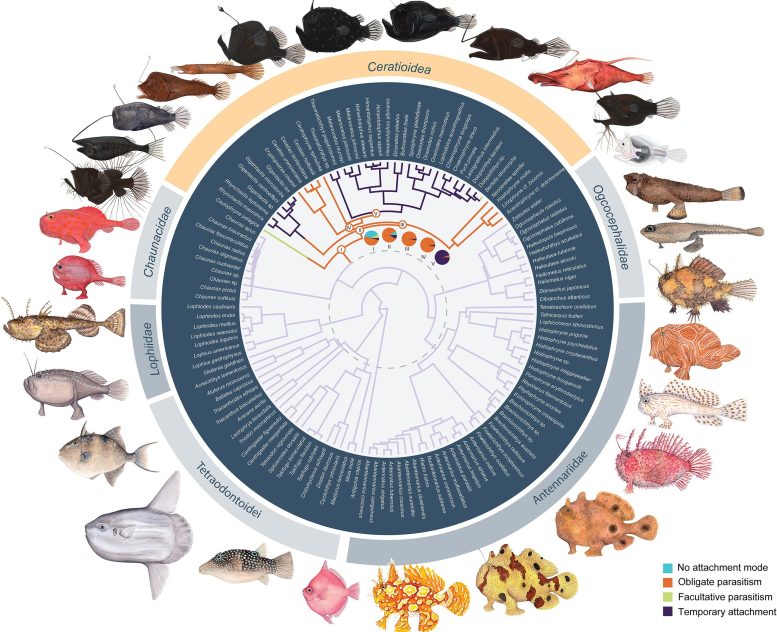
Research published in the scientific journal Current Biology reveals that sexual parasitism in anglerfishes originated during a major global warming event that led to their transition from the ocean floor to the deep sea. This adaptation facilitated rapid species diversification in the midnight zone of the oceans, influenced by both genetic and anatomical factors.
Evolution of Sexual Parasitism in Anglerfish
Members of the vertebrate group including anglerfishes are unique in possessing a characteristic known as sexual parasitism, in which males temporarily attach or permanently fuse with females to mate. Now, researchers published a study on May 23 in the journal Current Biology showing that sexual parasitism arose during a time of major global warming and rapid transition for anglerfishes from the ocean floor to the deep, open sea.
The findings have implications for understanding evolution and the effects that global warming may have in the deep sea, according to the researchers.
Anglerfish Evolution: A Journey From the Ocean Floor
“Our results show how the iconic deep-sea anglerfishes evolved from ancestors that walked along the ocean floor using modified pelvic fins,” says Chase D. Brownstein of Yale University. “Just like whales went back down in the water, anglerfishes jumped back up into the open water from walking ancestors on the deep ocean floor.
“We show that this happened more recently than thought after the extinction of the dinosaurs. After that, anglerfishes rapidly diversified in the ‘midnight’ (bathypelagic) zone of the oceans, which is likely a result of the ecological opportunities afforded by this new habitat. We show how the evolution of one of the strangest aspects of anglerfish biology, sexual parasitism, likely facilitated, but did not directly cause, this diversification.”
Genetic Insights Into Deep-Sea Diversification
Brownstein and colleagues were curious to understand how key ecological innovations relate to the evolution of new species. Rather than considering a trait in isolation, they wanted to understand how combinations of features interact. They focused their attention on anglerfishes, which they describe as one of the most famous and species-rich denizens of the deep sea. To better understand the relationships and ages of anglerfish species, they analyzed genome-scale DNA sequence data from over 100 species together with fossil evidence.
Their analyses show that the rapid transition of ancestrally bottom-dwelling, or benthic, anglerfishes into open-ocean, or pelagic, habitats occurred during a period of major global warming 50 to 35 million years ago. They also report that this transition coincided with the origins of sexual parasitism, which is thought to increase the probability of successful reproduction once a mate has been found in the midnight zone.
The Unusual Trait of Sexual Parasitism
“We show that this sexual parasitism trait is ancestral for all deep-sea anglerfishes and appears to have evolved as a synergistic combination of ancestral lability in the genetic basis of the adaptive immune system and body size dimorphism,” Brownstein says, noting that female anglerfishes do not reject males as foreign bodies, allowing fusion. “This explains the origins of such an odd trait.”
“I was pretty excited by the implication that sexual parasitism is really a combination of a bunch of different traits from different physiological, anatomical, and other systems that came together,” he says.
Future Research and the Impact of Global Warming
The findings provide a new level of insight into the evolution of life in the deep sea. They also might be a warning that global warming today could modify the course of deep-sea life for millions of years to come. The researchers now plan to look at more groups of deep-sea fishes to reconstruct their evolutionary histories.
“We are really at the starting line for investigations of the evolution of most deep-sea life forms, and the genomic data we have now for some groups suggests evolutionary histories in the deep sea might be very different from our initial hypotheses,” Brownstein says. “For example, the idea that all deep-sea life is ancient is clearly wrong; anglerfishes only swam into the open waters of the bathypelagic zone in the last 50 to 60 million years. This is a long time ago, to be sure, but it is much more recent—on the order of 50-60 million years—than we inferred previously using smaller DNA datasets and less informative fossils.”
For more on this discovery, see Yale Scientists Unveil the Mating Mysteries of Deep-Sea Anglerfish.
Reference: “Synergistic innovations enabled the radiation of anglerfishes in the deep open ocean” by Chase D. Brownstein, Katerina L. Zapfe, Spencer Lott, Richard Harrington, Ava Ghezelayagh, Alex Dornburg and Thomas J. Near, 23 May 2024, Current Biology.
DOI: 10.1016/j.cub.2024.04.066